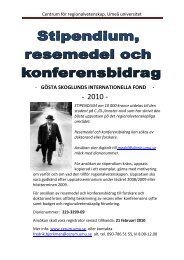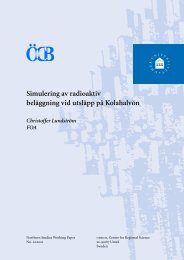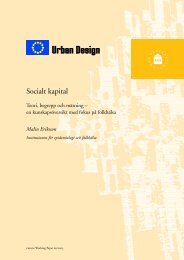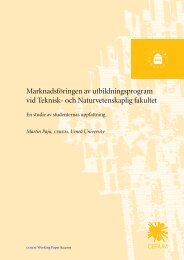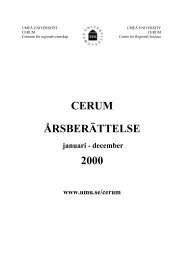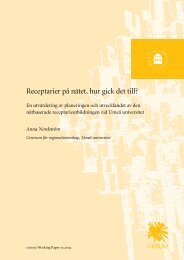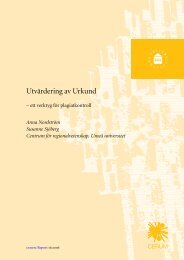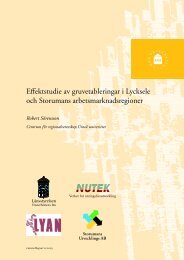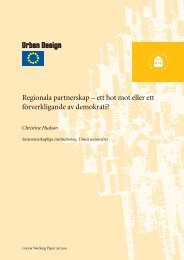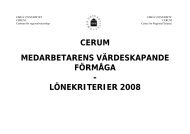- Page 1:
DOKTORSAVHANDLING Samverkansnätver
- Page 4 and 5:
Tryck: Universitetstryckeriet, Lule
- Page 7 and 8:
Förord En resa mellan olika värld
- Page 9:
innovationspolitik. De forsknings-
- Page 12 and 13:
Innovation i samverkansnätverket,
- Page 15 and 16:
1. Samverkan för innovation - en f
- Page 17 and 18:
använts som verktyg för att främ
- Page 19 and 20:
avgränsning snarare än ett ontolo
- Page 21 and 22:
som en del i min empiri och som jag
- Page 23 and 24:
utanför akademin eftersträvas. I
- Page 25:
forskningsfrågor går jag i nästa
- Page 28 and 29:
forskningspolitik och arbetslivspol
- Page 30 and 31:
tillväxtprogrammen som utgjort mot
- Page 32 and 33:
statsvetaren Markus Gossas (2006, s
- Page 34 and 35:
(regional) strategy.” Sveriges in
- Page 36 and 37:
skogsindustri, kemisk industri, gru
- Page 38 and 39:
Könsfördelning Mansdominans (mer
- Page 40 and 41:
använder för att nå målen i jä
- Page 42 and 43:
(Regeringskansliet 2004, sid 10). E
- Page 44 and 45:
långtifrån motsvarar det behov so
- Page 46 and 47:
utredningen lyftes ytterligare någ
- Page 48 and 49:
vilket bland annat resulterade i en
- Page 50 and 51:
ett ’nedifrånperspektiv’. Som
- Page 52 and 53:
innovationspolitik. På så sätt h
- Page 54 and 55:
konsekvenser, exempelvis i form av
- Page 56 and 57:
även han statsvetare, påpekar att
- Page 58 and 59:
De omfattande empiriska studier som
- Page 60 and 61:
kombinera teorier om innovationssys
- Page 62 and 63:
initiativ ofta av interventioner fr
- Page 64 and 65:
ett angreppssätt som jag beskriver
- Page 66 and 67:
varifrån halva delen av befolkning
- Page 68 and 69:
då begreppet kön som någonting s
- Page 70 and 71:
kön på ett sätt som är mer elle
- Page 72 and 73:
ett annat sätt än i dagens innova
- Page 74 and 75:
att förstå hur olika aktörer och
- Page 76 and 77:
när det gäller innovation och inn
- Page 78 and 79:
och underrepresentation av kvinnor
- Page 80 and 81:
innovationer antas uppstå med hjä
- Page 82 and 83:
som kunder och konsumenter utan äv
- Page 84 and 85:
koppling mellan de snäva definitio
- Page 86 and 87:
forskning. Lundvall (2006b, sid 2)
- Page 88 and 89:
Ekonomiforskaren Philip Cooke (m.fl
- Page 90 and 91:
espektive uppifrånperspektiv som a
- Page 92 and 93:
vem som tillåts bidra till och dra
- Page 94 and 95:
att driva en rad projekt i Emma Res
- Page 96 and 97:
Figur 4. Forskning i gränslandet m
- Page 98 and 99:
på ett och samma angreppssätt Mit
- Page 100 and 101:
och med att denna tradition syftar
- Page 102 and 103:
sid 7) resonemang. Denna process sk
- Page 104 and 105:
avhandlingens möte mellan genusfor
- Page 106 and 107:
Gunnarsson (2007) menar att den gen
- Page 108 and 109:
en grundpelare i socialt robust kun
- Page 110 and 111:
Herr & Anderson (2005, sid 85) kons
- Page 112 and 113:
målgrupper för projektets resulta
- Page 114 and 115:
utformar och genomför innovationsp
- Page 116 and 117:
dialogerna kan förbättra situatio
- Page 118 and 119:
Den andra uppgiften - som rörde nu
- Page 120 and 121:
uppmanades kontinuerligt att reflek
- Page 122 and 123:
sidan och de politiska villkoren å
- Page 124 and 125:
Etiska överväganden i interaktiv
- Page 126 and 127:
Sammanfattning och avstamp I detta
- Page 128 and 129:
126
- Page 130 and 131:
edömde att jag redan hade tillräc
- Page 132 and 133:
Sju av samverkansnätverkets medlem
- Page 134 and 135:
De ord som står skrivna längst ti
- Page 136 and 137:
”Jag tror det här med att visa s
- Page 138 and 139:
Innovation i samverkansnätverket I
- Page 140 and 141:
en överblick över olika typer av
- Page 142 and 143:
leka att de förflyttar sig mellan
- Page 144 and 145:
människor och spelregler inom vilk
- Page 146 and 147:
Omvärldens betydelse I detta avsni
- Page 148 and 149:
verksamheterna har bland andra vari
- Page 150 and 151:
istande kunskap och osynliggörande
- Page 152 and 153:
Figur 11. Teckning från uppgiften
- Page 154 and 155:
eror på att vi har ett renskötsel
- Page 156 and 157:
”Det är ju en kamp. Ingenting ä
- Page 158 and 159:
grundades på bedömningen att tekn
- Page 160 and 161:
Emma Resurscentrum i Västerbotten
- Page 162 and 163:
kunskapsutvecklingen. Ytterligare e
- Page 164 and 165:
en koppling mellan diskurs och mate
- Page 166 and 167:
och insatser i kluster. Länsstyrel
- Page 168 and 169:
Av det empiriska materialet framgå
- Page 170 and 171:
esurscentra för kvinnor. Samverkan
- Page 172 and 173:
I det befintliga textmaterialet och
- Page 174 and 175:
skäl till att de kunnat överleva
- Page 176 and 177:
Vid det uppföljande dialogseminari
- Page 178 and 179:
• Hopfällbar transportvagn → D
- Page 180 and 181:
lommor. Och på så sätt försöke
- Page 182 and 183:
Apropå den förståelse av innovat
- Page 184 and 185:
Arbetsförmedlingen, Svenskt Närin
- Page 186 and 187:
direkt erbjöd sig att vid nästa u
- Page 188 and 189:
som skulle föreläsa. Sedan så fr
- Page 190 and 191:
mest var bröllopsarrangemang, var
- Page 192 and 193:
Även på den kommunala nivån har
- Page 194 and 195:
april 2006 i Flens kommunhus. Fem a
- Page 196 and 197:
alla av seminariedeltagarna som hö
- Page 198 and 199:
Nära kopplat till denna vision fan
- Page 200 and 201:
En av uppgifterna som deltagarna st
- Page 202 and 203:
Dessutom kan den ideella organiseri
- Page 204 and 205:
Det förekom även ett utbyte av vo
- Page 206 and 207:
Det sista området - tillverkningsi
- Page 208 and 209:
koder, alternativa företagsregiste
- Page 210 and 211:
som innovationer i betydelse av nya
- Page 212 and 213:
ör antalet företagare, könsförd
- Page 214 and 215:
”Ta Fordons-klustret och så titt
- Page 216 and 217:
Figur 15. Teckning från uppgiften
- Page 218 and 219:
”Visst existerar de, för jag ser
- Page 220 and 221:
”Jag visste väl allting som han
- Page 222 and 223:
vara ett projekt som det är idag.
- Page 224 and 225:
Ordvalens betydelse gör sig synlig
- Page 226 and 227:
medvetna om att det kontrasterar mo
- Page 228 and 229:
sektorn. Varje samverkansnätverk h
- Page 230 and 231:
228
- Page 232 and 233:
2000a, 2000b) angreppssätt för ic
- Page 234 and 235:
har ställt samma frågor som Wendt
- Page 236 and 237:
att samtliga samverkansnätverk har
- Page 238 and 239:
av dagens resurscentra skapades eft
- Page 240 and 241:
högst väsentlig att ställa i rel
- Page 242 and 243:
valuta som medfinansiering i samver
- Page 244 and 245:
Lika Villkor Företagsamma Kv. Emma
- Page 246 and 247:
Distinktionen mellan kategorierna
- Page 248 and 249:
homosociala strukturer - exemplet V
- Page 250 and 251:
nätverksdeltagarna skapat ett hand
- Page 252 and 253:
I detta avsnitt kommer jag att disk
- Page 254 and 255:
SAGA:s strategi att bygga ett helt
- Page 256 and 257:
esurscentra. I detta blir ytterliga
- Page 258 and 259:
initierade några av deltagarna en
- Page 260 and 261:
Samverkansnätverk SAGA Emma Resurs
- Page 262 and 263:
Inte minst inom områdena hälsa, h
- Page 264 and 265:
centrum för de snäva definitioner
- Page 266 and 267:
och erfarenheter från en könssegr
- Page 268 and 269:
samverkansnätverkens innovationer
- Page 270 and 271:
som betonat det ömsesidiga beroend
- Page 272 and 273:
anslutning till varje forskningsfr
- Page 274 and 275:
stor utsträckning verksamma inom I
- Page 276 and 277:
samverkansnätverkens verksamheter
- Page 278 and 279: esultaten kommit att präglas av n
- Page 280 and 281: idragit till detta. Vilken typ av i
- Page 282 and 283: Även när det gäller begreppet
- Page 284 and 285: och forskningen. Min slutsats är a
- Page 286 and 287: uppifrån- och ett nedifrånperspek
- Page 288 and 289: introduktion av begreppet ’quattr
- Page 290 and 291: På detta vis har jag låtit uppifr
- Page 292 and 293: att bekämpa marginaliseringen av k
- Page 294 and 295: • Orsakssamband i organisering av
- Page 296 and 297: Den teoriutveckling jag föreslår
- Page 298 and 299: skulle kanske de fyra samverkansnä
- Page 300 and 301: nätverksdeltagarna ansett spela ro
- Page 302 and 303: Dessa hinder för kvinnors möjligh
- Page 304 and 305: innovationsforskningen relateras ti
- Page 306 and 307: 304
- Page 308 and 309: Andersson Susanne, Amundsdotter Eva
- Page 310 and 311: Cooke Philip, Heidenreich Martin &
- Page 312 and 313: Goldfarb Brent & Henrekson Magnus (
- Page 314 and 315: Jacobsen Dag Ingvar & Thorsvik Jan
- Page 316 and 317: Lindberg Malin (2009). Män och man
- Page 318 and 319: Nyberg Ann-Christin (2009). Making
- Page 320 and 321: Sorensen Eva & Torfing Jacob red (2
- Page 322 and 323: Walby Sylvia (2005). Gender mainstr
- Page 324 and 325: Lägesrapport till Vinnova i projek
- Page 326 and 327: 324
- Page 330 and 331: especially highlighted entrepreneur
- Page 332 and 333: 330
- Page 334: Företagsamma Kvinnor De dokument j



